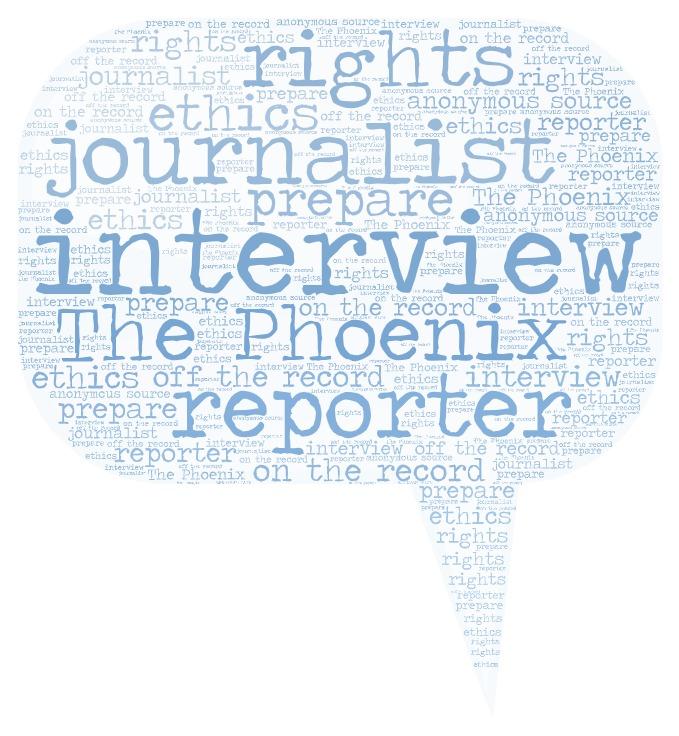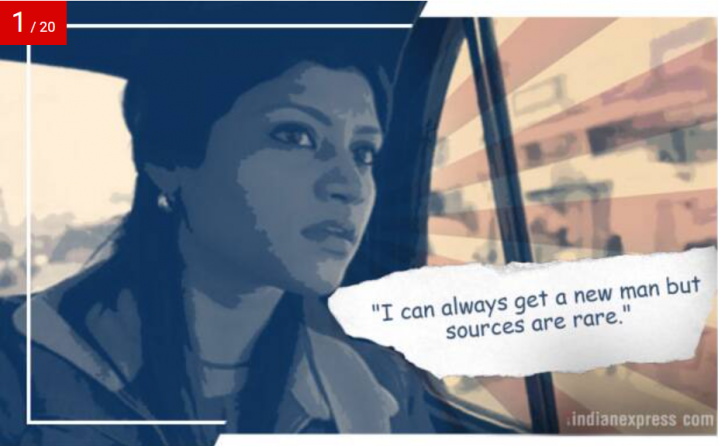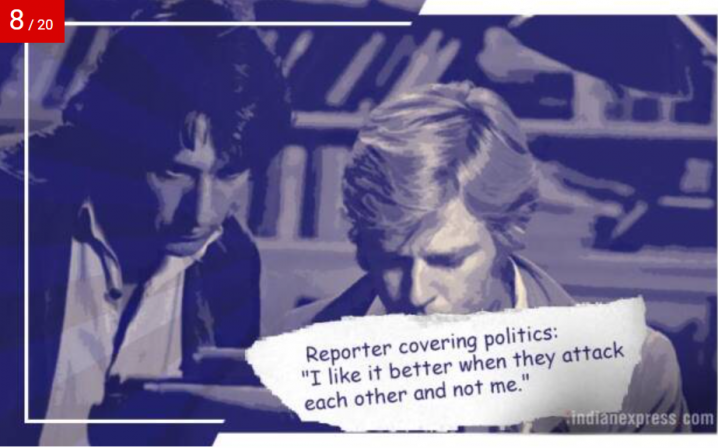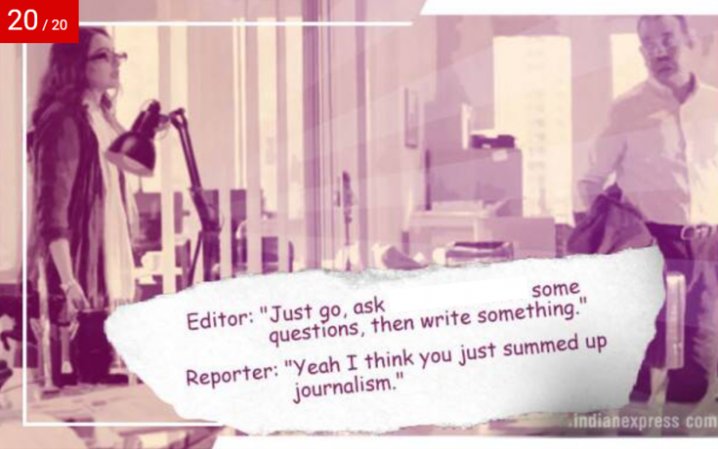
By Sadie Murphy
The Phoenix does everything in its power to ensure that all situations are handled ethically. We hold each other accountable as representatives of our name, our school, and journalism culture.
After some confusion about the rights of individuals verses the rights of journalists, we have decided to provide you with a list of your rights and advice to prepare you to be informed and comfortable talking to reporters in the future. So breathe deeply and get ready.

-
“IF IN DOUBT, LEAVE IT OUT”1
It isn’t always in your best interest to comment on everything. It is unethical to lie to a reporter. If you have not had the proper time to prepare for a question, feel comfortable to tell the journalist that. It’s simple. Just tell them you would like to double-check your information and get back to them. They will appreciate the accuracy and you will become a reliable resource for them.2
David Grinberg, a strategic communications consultant for multi-national corporations, advises that you should assume that everything is “on the record” with journalists. This means that after identifying themselves as a reporter, anything you tell them can be used in a paper with your name attributed – unless you state that something is “off the record (unusable)” or that you’d like to “speak on background –“ meaning you would like to remain anonymous (unnamed in the paper or given a pseudonym). Reporters have gone to jail countless times for failing to reveal a source in the case of national security. In almost every other case, the system may try to propel a journalist to reveal a source but cannot force them.
The only time that a reporter could publish provided information in an article without identifying themselves as a reporter is if the information obtained is pertinent to the safety of the public.
On the other hand, you may not feel that the reporter interviewing you is asking you the right questions to allow you to completely explain the situation. In this case, do not feel uncomfortable to elaborate on questions – even if you feel like you are getting off topic or just babbling. Journalists are people too. We understand how frustrating it can be to be unable to talk about what you feel is important. Sometimes, we just get too caught up in ensuring we have our questions answered that we don’t stop and ask, “what would you like to say about this?”

-
EDUCATE YOURSELF FIRST!2
Journalists are not the only ones who are allowed to ask questions during an interview. During introductions, you should make it a point to get the reporter's name, the story they’re working on, the media outlet they are working with, who else they will be interviewing, and the reporter's typical beat (or subject they cover most frequently). Most of the time, the reporter will provide you with these before you have the chance to ask.
While you have no right to demand for a reporter to reveal the extent of their article or allow you to view their questions before you agree to an interview, you can ask to review the article or article excerpts pertinent to your contribution when accuracy is imperative or subject matter is complex. Keep in mind that a journalist DOES NOT have to let you review the article before publication but may decide to if the situation deems it necessary. Often, a reporter will let you review your quotations to be sure your words are accurate, but not the rest of the story.
ALWAYS ask whether you are being recorded. This includes when you are giving a phone or radio interview. Journalists do not have to right to intercept or record a phone call when they are not a participant in the conversation. However, if anyone is a participant in the conversation and decides to record, they have every right and do not have to notify the other parties. This is due to the one-party consent rule. “The person doing the recording can be the person consenting.” This also means that you have the right to record what you say to the interviewer.3
A journalist cannot record you in a place that you have a reasonable expectation of privacy (unless you have engaged in conversation with them). Even then, a journalist cannot publish an article using information quoted from you unless they have identified themselves beforehand or asked for your informed consent. A journalist can use overheard or casually provided information without identifying themselves to gather relevant information, as long as, they do not include any identifying attributes. Areas where a reasonable expectation of privacy is expected include private residences (hotel rooms and private jail cells included), public restrooms, and phone booths.3
“There’s no reasonable expectation of privacy in public places, such as streets, parks, and large public gatherings. Journalists are free there to observe and record what they can see and hear.”3 Classrooms do not have a reasonable expectation of privacy, even when students are not present, or the door is shut and locked. This is because classrooms are a shared space and are accessible to more than one individual - unlike a file cabinet or the inside of a private work desk, which does have an expectation of privacy and is off limits to reporters without expressed permission.4

-
PICK THE PLACE!
It’s important that you feel as comfortable as possible throughout the interview. You have just as much a right to determine the setting of the interview. Rather than go to Starbucks, suggest hitting up your favorite restaurant together. While it is courteous to meet at a central location, a familiar location could be the key to a breakthrough interview. There are amazing local and historical locations viable for Gilmer county.
If you’re from Cox's Mills or anywhere in the northern part of Gilmer, try hanging out at the Post Office in Troy - named after the pioneer John Troy who settled there and severed as the first postmaster. If you’re from Normantown or anywhere in the southern part of the county, try taking away some of the tension at Cedar Creek State Park. If you’re from Kemper or anywhere in the eastern part of the county, park at Tomblins Service Station and explore the small (less than 200 people) town of Sand Fork. If you’re from Tanner of any of the western parts of the county, try Mt. Pisgah Church.

As representatives of our name, our school, and journalism culture, we’ve been able to bond over the frustrations and anxieties surrounding journalism. Don’t let that be what ruins it for you.
- Information in this section was provided by: https://dbgrinberg.medium.com/ten-tips-for-talking-to-reporters-d3bf145daf19 (unless specified differently).
- Information in this section was provided by: http://guide.saferoutesinfo.org/media/rights_interviewee.cfm (unless specified differently).
- Information provided by: https://www.cjr.org/united_states_project/can_i_do_that_a_legal_primer_for_journalists.php .
- Information provided by: https://news.schoolsdo.org/2017/09/no-reasonable-expectation-of-privacy-in-a-classroom/ .
Share article on:

